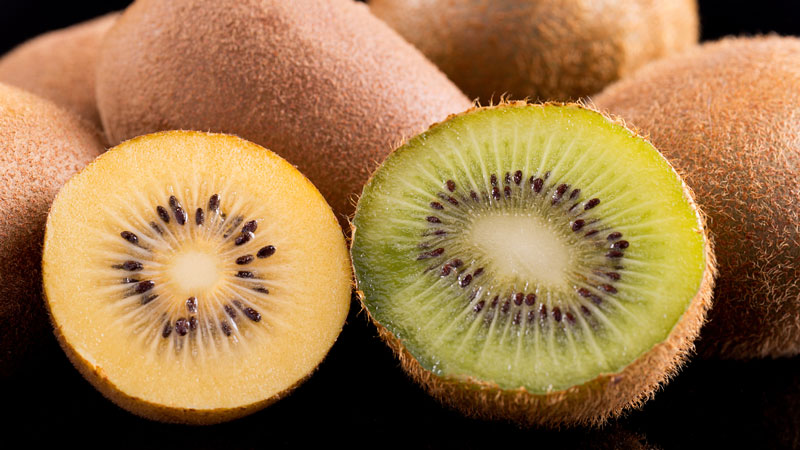
Kiwifruit or kiwis, as we usually refer to them, come in two varieties: the green kiwi, which is tangy, sweet and sour; and the gold kiwi, which is usually favored by children because of its sweeter tropical flavor. Both are incredibly nutritious, though there are some differences as you will notice when you try out our personalized calculator below.
Overall, kiwis are a fantastic source of vitamin C, having 2 to 3 times the amount found in oranges! They also provide good amounts of vitamin E, vitamin K, folate, copper, potassium, and fiber.
Kiwis are great for our immune system. The high levels of vitamin C and E, together with other antioxidants, protect us against free radicals and increase our natural killer cell activity to help us fight cancer cells. Kiwifruit also aid in DNA protection and repair. And, as you’ll see in more detail below, kiwis can help us fight and prevent the common cold, and they aid our sleep and digestion.
Something to keep in mind is that kiwifruit have an enzyme named actinidin that breaks down protein, facilitating its digestion. This is usually a good thing. Unfortunately, this enzyme might also cause allergic reactions in some people. Always start with small amounts when you first try kiwis or give them to your children to verify it’s safe to eat them. Contact your doctor at the first sign of kiwi or any other food allergy. More details below.
Kiwi Nutrition Calculator
Use our personalized nutrition calculator to discover the percentage of daily nutrition needs you and your family can get from eating green or gold kiwi.
Nutrition needs vary according to age, sex, and whether women of reproductive age are pregnant or breastfeeding. Fill out the form below for yourself and for your family members to get personalized results.*
* Calculated as a percentage of the Recommended Daily Allowances (RDAs) as established by the U.S. Department of Agriculture and the U.S. Department of Health and Human Services. Based on green and gold kiwi nutritional information provided by the U.S. Department of Agriculture.
Tips to Select and Enjoy Your Kiwis
Organic or Not?
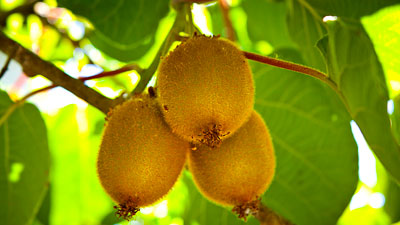
Kiwis are number 15 on The Clean 15 list provided by the Environmental Working Group (EWG), they dropped from position 9 in 2024. Still, they remain in the clean list which means that you can skip the more expensive organic kiwis and stock up on conventional kiwifruit instead.
How to Select Kiwis
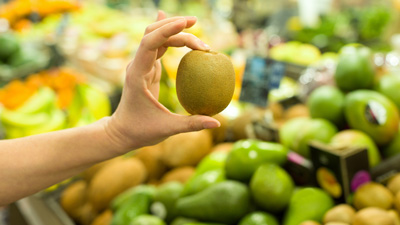
When buying kiwis, select those that are firm (unripe) or slightly soft (ripe) when you squeeze them. If they are too soft, it means they’re already overripe. If your kiwis are unripe, keep them at room temperature to ripen them, avoiding direct sunlight. Refrigerate your ripened kiwifruit or your unripe fruit if you want it to last longer.
Should We Eat the Skin?
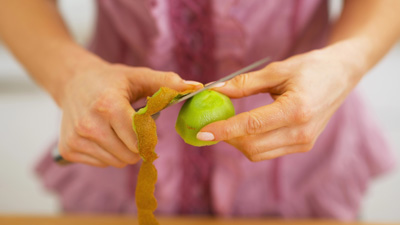
Though people often avoid eating the skin due to its fuzziness or hard texture, it is completely safe to eat it. Plus, it enhances your fiber intake by 50% as well as other nutrients.
Kiwis May Cause Allergies
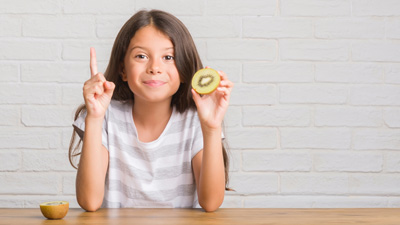
Sadly, kiwis are the number three allergy causing food, after cow milk and eggs, and before peanuts! The reaction can be a mild tingling in the mouth or throat, but in children especially, it can cause an anaphylactic (life-threatening) reaction. For this reason, always start with a small amount when you first feed it to your kids, and call your doctor at the first allergy sign. Learn more.
Kiwis are Safe for Cats and Dogs

Yes, you can share your kiwis with your furry babies. But do it in moderation, as a treat, because of their high sugar content. Do not give them the skin, since the fuzzy texture can get stuck in their throats (particularly with cats), and be sure not to give the whole fruit to larger dogs to prevent choking. As with any new food, start with a small amount to see how they react.
Important Things to Know
References



